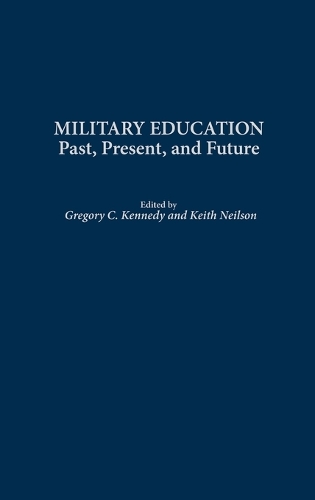
Military Education: Past, Present, and Future
(Hardback)
Publishing Details
Military Education: Past, Present, and Future
By (Author) Gregory C. Kennedy
Edited by Keith Neilson
Bloomsbury Publishing PLC
Praeger Publishers Inc
30th December 2002
United States
Classifications
General
Non Fiction
Warfare and defence
355.00711
Physical Properties
Hardback
256
Width 156mm, Height 235mm
510g
Description
Often the only time a nation evaluates the education of its armed forces is during the aftermath of a great military disaster. Even in the light of an overwhelming victory, such as the Gulf War, questions about how well military education was addressing the study of asymmetric warfare, the Revolution in Military Affairs, the role of non-state actors and international relations in the new world order were the subject of debate in and around the various staff colleges and military universities in the West. This work brings together the ideas of international scholars, all recognized as leaders in their fields, to examine the professional military education experience of various nations during the last 250 years. Case studies of each branch of the military reveal success and failure in the past and present, with a goal of improving military education in the future. Underlying themes clearly reveal the need for those questioning military education to utilize history as the preferred method and model of imperial analysis. These include economics and defense spending; national psyches and the proper maintenance of armed forces; and the importance of individuals, both military and civilian, with a clear vision, determination, and the moral courage to formulate and support military education programs. In practice, training often predominates over education, and the result has frequently been an officer corps that has not functioned well in peacetime preparations and has ultimately failed on the battlefield due to an inability to think effectively. This study highlights the role of civilian educators as vital in the creation of successful educational programs.
Reviews
[E]xamines how professional militaries in Europe and North America have attempted to bridge the gap between theory and practice.-Army History
[S]hould be of great interest to anyone interested in the military, the education of professionals, or in education more generally.-The Army Historical Review
Understanding how militaries educate their professionals is therefore not nearly as parochial as the volume's title might suggest. Instead, it is indicative of a society's fundamental assumptions about the place of the military, the nature and value of education more generally, and the relative importance of military and civilian models. The book under review explores these themes with an admirable depth in comparative context. It should be of great interest to anyone interested in the military, the education of professionals, or in education more generally.-Comparative/world
"Examines how professional militaries in Europe and North America have attempted to bridge the gap between theory and practice."-Army History
"Should be of great interest to anyone interested in the military, the education of professionals, or in education more generally."-The Army Historical Review
"[E]xamines how professional militaries in Europe and North America have attempted to bridge the gap between theory and practice."-Army History
"[S]hould be of great interest to anyone interested in the military, the education of professionals, or in education more generally."-The Army Historical Review
"Understanding how militaries educate their professionals is therefore not nearly as parochial as the volume's title might suggest. Instead, it is indicative of a society's fundamental assumptions about the place of the military, the nature and value of education more generally, and the relative importance of military and civilian models. The book under review explores these themes with an admirable depth in comparative context. It should be of great interest to anyone interested in the military, the education of professionals, or in education more generally."-Comparative/world
Author Bio
GREGORY C. KENNEDY is Lecturer at King's College London, based at the Joint Services Command and Staff College. He is the author of Anglo-American Strategic Relations and the Far East, 1933-1939 (2002). KEITH NEILSON is Professor of History at the Royal Military College of Canada. He is the author of Strategy and Supply: The Anglo-Russian Alliance, 1914-1917 and The Last Tsar: British Policy and Russia, 1894-1917.
